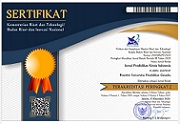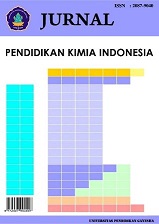The Development of E-Module of Hydrocarbon Material Using Lectora Inspire
DOI:
https://doi.org/10.23887/jpki.v7i2.51655Abstract
Hydrocarbon material is one of the materials in chemistry which is a problem for chemisty education students. In order to develop learning media that makes it easier for students to understand hydrocarbon, research to the development of e-modules is carried out. The goal of this research is to create an e-module of hydrocarbon material that is useful and receives positive feedback. ADDIE model consisted of analysis, design, and development was used as research and development model in this study. In total 12 students from the Chemistry Education Study Program FKIP Untan, and 32 students from the main test served as respondents. Measurement and indirect communication techniques are employed in the investigation. Feasibility evaluation sheets and response questionnaires are the instruments utilized for data collection. The results show that the e-module is highly viable, with a percentage of material feasibility 88%, linguistic feasibility 91%, technical feasibility 92%, and 95% graphic viability. In the initial experiment, the proportion of student questionnaire responses was calculated at 83%, and in the main test, it was calculated at 84%, which was deemed to be very good. E-module of hydrocarbon material using Lectora Inspire was pronouneed to be extremely feasible and received a very good reaction based on the research findings, that it can be used as a learning resource in learning hydrocarbon material to improve students’ understanding.
References
Afandi, R. (2015). Development of Snakes and Ladders Game Learning Media to Improve Student Motivation and Social Studies Learning Outcomes in Elementary Schools. JINoP (Journal of Learning Innovation), 1(1), 77. https://doi.org/10.22219/jinop.v1i1.2450 DOI: https://doi.org/10.22219/jinop.v1i1.2450
Amanullah, MA (2020).Learning Media Flip Book to Support the Learning Process in the Industrial Revolution Era 4.0. JJDP (Journal of Education and Learning Dimensions), 1(2), 37-44. https://doi.org/10.24269/dpp.v0i0.2300 DOI: https://doi.org/10.24269/dpp.v0i0.2300
Andre, ER, Zonalia. F. (2021). Description of Students' Misconceptions on Hydrocarbon Compounds. Journal of Educational Sciences, 3(4), 1495-1502. https://doi.org/10.31004/edukatif.v3i4.525 DOI: https://doi.org/10.31004/edukatif.v3i4.525
Aprilia, Y. & I. (2021). Development of an Android-Based Chemical Snakes and Ladders Game as a Learning Media on Hydrocarbon Compounds in High Schools. Educational Journal: Journal of Early Childhood Education, 3(4), 1220–1230. https://doi.org/10.31004/edukatif.v3i4.548 DOI: https://doi.org/10.31004/edukatif.v3i4.548
Arikunto, S. (2013). Research Procedure A Practical Approach. Jakarta: Rineka Cipta.
Ariana, Situmorang, & Krave. (2020). Development of Discovery Learning-Based Modules on Plant Tissue Materials to Improve Science Literacy Skills for Class Xi Science High School Students. Journal of Mathematics and Science Education, 11(1), 34–46. https://doi.org/http://dx.doi.org/10.26418/jpmipa.v11i1.31381. DOI: https://doi.org/10.26418/jpmipa.v11i1.31381
Asfiah, N., Mosik, M., & Purwantoyo, E. (2013). Development of Contextual Integrated Science Modules on Sound Themes. USEJ- Unnes Science Education Journal, 2(1), 188-195.
Bagus, C., Afifulloh, M. (2020). Electronic Module (E-Module) based on Component Display Theory (CDT) for Integrated Learning Courses. JINOTEP-Journal of Learning Technology Innovation, 7(1), 49-56. https://doi.org/10.17977/um031v7i12020p049 DOI: https://doi.org/10.17977/um031v7i12020p049
Chess, D. F . (2013). Misconception Analysis of Chemistry Education Students on Hydrocarbon Material. Scientific Journal of IKIP Mataram, 6(2), 94-95.
Darmayasa, IK, Jampel, N., & Simamora, AH (2018). Development of a Character Education Oriented Science E-Module at SMP Negeri 1 Singaraja. Undiksha Edutech Journal, 6(1), 53–65. https://doi.org/http://dx.doi.org/10.23887/jeu.v6i1.20267.
Ministry of National Education. (2008). Guide to Development of Teaching Materials. Jakarta: BP. Indonesian Business Partners.
Ellis, JW (1994). How Are We Going to Teach Organic Chemistryif The Task Force Has its Way?. Journal of Chemical Education, 71(5), 399-403. https://doi.org/10.1021/ed071p399 DOI: https://doi.org/10.1021/ed071p399
Ejin, S. (2016). The Effect of Problem Based Learning Model on Concept Understanding and Critical Thinking Skills of Grade IV Students. Journal of Education, 1(1), 65-71. https://doi.org/10.26740/jp.v1n1.p66-72 DOI: https://doi.org/10.26740/jp.v1n1.p66-72
Fakhrurrazi, M., Masykuri, M., & Sarwanto. (2017). Analysis of Chemistry Learning on the Main Materials of Hydrocarbons and Petroleum. National Seminar on Science Education, 21(10), 167–171.
Imbar, K., Ariani, D., Widyaningrum, R., & Syahyani, R. (2021). Variety of Storyboards for Learning Media Production. Journal of Innovative Learning, 04(01), 108-120. https://doi.org/10.21009/JPI.041.14 DOI: https://doi.org/10.21009/JPI.041.14
Ira, L & Erlina. (2020). Needs Analysis of Organic Chemistry Learning Resources and Media. Edu Chemia (Journal of Chemistry and Education), 10(10), 1-8.
Kartikasari, S. (2021). The Influence of Using E-Modules on Hydrocarbon Compounds in Independent Learning for Class XI at SMA Negeri 3 Palangkaraya for the 2020/2021 Academic year. Journal of Chemistry Education Research, 11(2), 74-81. https://doi.org/10.21009/JRPK.112.03 DOI: https://doi.org/10.21009/JRPK.112.03
Kiruna, H., Subekti, S., & Gendroyono, P. (2020). Development of Lectora Inspire-Based Electronic Modules in Electrical Motor Installation Subjects. Journal of Electrical Vocational Education and Technology, 3(1), 12-7. https://doi.org/10.21009/jevet.0031.03 DOI: https://doi.org/10.21009/JEVET.0031.03
Kriesna, K., P (2021). Analysis On Students' Understanding Of Hydrocarbon Compounds In Organic Chemistry II Course. Edu Chemia (Journal of Chemistry and Education), 2(6) 220-221.
Kurniasari, Nia, AV, & Isnaini, H. (2018). Analysis of Spelling Errors in One of the News Headlines "Isu Tka Fried Ahead of the Presidential Election" in the Tribun Jabar Newspaper, April 25, 2018. Journal of Indonesian Language and Literature Education, 1(4). https://doi.org/10.30870/educhemia.v6i2.10727 DOI: https://doi.org/10.30870/educhemia.v6i2.10727
Lestari, Eka & Rahman, A., A. (2013). Development of Learning Modules for Contextual Mathematics Story Problems in English for Class X Students. Articles. Malang: State University of Malang.
Mufidah, CI (2014). Development of Learning Model on Basic Competence of Public Relations Class X Apk 2 at SMKn 10 Surabaya. Journal of Office Administration, 2(2), 1-17.
Nazalin, N., & Muhtadi, A. (2016). Development of Interactive Multimedia Learning Chemistry on Hydrocarbon Materials for Class XI Students. Journal of Educational Technology Innovation, 3(2), 221. https://doi.org/10.21831/jitp.v3i2.7359. DOI: https://doi.org/10.21831/jitp.v3i2.7359
Niluh, PEW, Astawan. IG(2021). Interactive Teaching Materials Containing Character Education on Respiratory System Materials in Humans and Animals. Journal of the Pulpit of Sciences, 26(3), 364-373. https://doi.org/10.23887/mi.v26i3.37088 DOI: https://doi.org/10.23887/mi.v26i3.37088
Nurbaeti,RU (2019). Development of Problem Based Learning Science Teaching Materials for Grade V Elementary School Students. Journal of Pendas Cakrawala, 5(1). https://doi.org/10.31949/jcp.v5i1.1233. DOI: https://doi.org/10.31949/jcp.v5i1.1233
Nurmariza, A., Ibrahim, M., & Widodo, W. (2017). Development of Activity-Based Teaching Materials with Interactive Cd Media on Hearing and Sonar System Materials. JPPS (Journal of Science Education Research), 6(1), 1113. https://doi.org/10.26740/jpps.v6n1.p1113-1122 DOI: https://doi.org/10.26740/jpps.v6n1.p1113-1122
Prastowo, A. (2014). Creative Guide to Making Innovative Teaching Materials. Yogyakarta : Diva Press.
Riduan. (2008). Management Scale of Research Variables. Bandung: Alphabeta.Rosa, FO (2015). Development of Science Learning Modules for Middle School Science Process Skills-Based Pressure Materials. Journal of Physics Education, 3(1). https://doi.org/10.24127/jpff.v3i1.21.
Rukoyatun. (2018). Development of Interactive E-modules as Learning Resources for Basic Graphic Design for Class X SMK 9 Surakarta. Surakarta: Muhammadiyah University of Surakarta.
Sartono. (2016). Utilization of Blogs as Alternative Learning Media in Schools. Journal of Teacher Transformation at SMA Negeri 2, 123.
Shalikhah, ND (2016). Utilization of the Lectora Inspire Application as an Interactive Learning Media. Journal of Ca krawala, 11(1), 113. https://doi.org/10.31603/cakrawala.v11i1.105 DOI: https://doi.org/10.31603/cakrawala.v11i1.105
Siti, M., Seruni, R., Nurjayadi, M., Kurniadewi, F. (2019), Development Biochemistry E-module on Carbohydrate Metabolism Materials for Chemistry Study Program Students. Tadris Kimiya Journal 4(1), 69-77. https://doi.org/10.15575/jtk.v4i1.4679 DOI: https://doi.org/10.15575/jtk.v4i1.4679
Sorraya, A. (2014). Development of Complex Procedure Text Teaching Materials in Indonesian Language Learning for Class X SMK. Imperative Actions in Learning Discourse at SMKN I Bangil, 2(2).
Sugiyono. (2018). Educational Research Methods (Quantitative, Qualitative, and R&D Approaches). Bandung: Alphabeta.
Suryanda, Ernawati, & Maulana. (2016). Development of Mobile Learning Multimedia Module with Android Studio 4.1 Biodiversity Materials for Class X High School Students. Journal of Biology Education, 9(1), 55–64. https://doi.org/https://doi.org/10.21009/biosferjpb.9-1.9. DOI: https://doi.org/10.21009/biosferjpb.9-1.9
Sydiq & Najuah. (2020). Development of Android-Based Interactive E-modules in Teaching and Learning Strategy Courses. Journal of Historical Education. 9(1), 1-4.
Umiatsih, DW (2017). Development of Spreadsheet Software Operation Learning E-module at SMK Negeri 1 Depok. Journal of Technical and Vocational Education, 6(7). https://doi.org/10.21831/jpv.v6i1.8113 DOI: https://doi.org/10.21831/jpv.v6i1.8113
Ummi, A. (2018). Development of Biology Learning Media for Semester II Class X SMA Based on Lectora Inspire. Nalax Journal of Education, 6(1), 41. https://doi.org/10.26858/jnp.v6i1.6041 DOI: https://doi.org/10.26858/jnp.v6i1.6041
Wijayanti, NPA, Damayanti, LPE, et al (2016). Development of Project Based Learning-Based E-modules on Digital Simulation Subjects for Class X Students Case Studies at SMK Negeri 2 Singaraja. Journal of Technological And Vocational Education, 13(2), 184-197. https://doi.org/10.23887/jptk-undiksha.v13i2.8526 DOI: https://doi.org/10.23887/jptk.v13i2.8526
Winatha, KR, Suharsono, N., & Agustin, K. (2018). Development of Interactive E-Module Based on Digital Simulation Subject Projects. Journal of Technological and Vocational Education, 188-199. https://doi.org/10.23887/jptk-undiksha.v15i2.14021 DOI: https://doi.org/10.23887/jptk-undiksha.v15i2.14021
Wulansari, EW, Kantun, S., & Suharso, P. (2018). Development of E-Module Learning Economics Capital Market Materials for Students of Class Xi Ips Man 1 Jember 2016/2017 Academic Year. JOURNAL OF ECONOMIC EDUCATION: Scientific Journal of Education, Economics and Social Sciences, 12(1), 1. https://doi.org/10.19184/jpe.v12i1.6463 DOI: https://doi.org/10.19184/jpe.v12i1.6463
Downloads
Published
How to Cite
Issue
Section
License
Copyright (c) 2024 Maya Miranti, Rini Muharini, Ira Lestari, Erlina, Rachmat Sahputra

This work is licensed under a Creative Commons Attribution-ShareAlike 4.0 International License.
Authors who publish with the Jurnal Pendidikan Kimia Indonesia agree to the following terms:
- Authors retain copyright and grant the journal the right of first publication with the work simultaneously licensed under a Creative Commons Attribution License (CC BY-SA 4.0) that allows others to share the work with an acknowledgment of the work's authorship and initial publication in this journal.
- Authors are able to enter into separate, additional contractual arrangements for the non-exclusive distribution of the journal's published version of the work (e.g., post it to an institutional repository or publish it in a book), with an acknowledgment of its initial publication in this journal.
- Authors are permitted and encouraged to post their work online (e.g., in institutional repositories or on their website) prior to and during the submission process, as it can lead to productive exchanges, as well as earlier and greater citation of published work. (See The Effect of Open Access)





